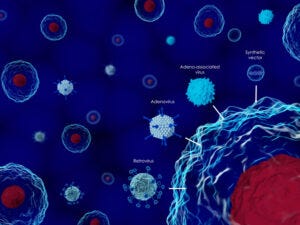December 20, 2022

Gene therapy developers need access to high quality viral vectors and to meet this need suppliers need to optimize manufacturing processes, says Genemagic Biosciences’ CEO, Jingmin Zhou.
Viral vectors are empty virus particles that can be used to deliver selected sections of genetic material into target cells. They are a key component of modern molecular biology and have been used in everything from cell line development through to crop engineering.
In addition, viral vectors are vital to the cell and gene therapy sector. Unfortunately, vectors are also complex and time consuming to manufacture, particularly at large scale which – given the surge in demand seen in recent years – is a challenge according to Zhou.

Image: iStock/Meletios-Verras
The Genemagic Biosciences’ chief detailed the challenge at recent the cell and gene therapy manufacturing and commercialization conference, telling delegates one difficulty vector suppliers face is the efficiency mismatch between upstream and downstream manufacturing processes.
“Optimization of viral vector-based upstream manufacturing processes has led to significant increases in production titer for gene therapy in recent years. Downstream process and manufacturing capacity must be reevaluated to better accommodate the increases in titer within the challenged timeline.”
Zhou explained that while viral vector titers achieved during upstream production have increased, in downstream stems purification and recovery processes have not advanced significantly particularly for the two most commonly used vectors.
He added that significant improvements are essential to reduce cost of goods, increase manufacturing efficiency by reducing batch-batch variations and lower the therapeutic dose required for each product.
Immune response
The latter point about reducing dosage is in keeping with the findings of a separate study co-authored by Genemagic scientists that raised concerns about the risk of immune response to viral vectors.
The research, which was published in September, points to “an increasing number of recent studies indicate that immune responses against AAV and transgene products” which the authors suggest could be could be a bottleneck for the gene therapy sector.
They write “In clinical studies, pre-existing antibodies against AAV capsids exclude many patients from receiving the treatment as there is high prevalence of antibodies among humans.
“Moreover, immune response could lead to loss of efficacy over time and severe toxicity, manifested as liver enzyme elevations, kidney injury, and thrombocytopenia, resulting in deaths of non-human primates and patients.”
About the Author
You May Also Like




